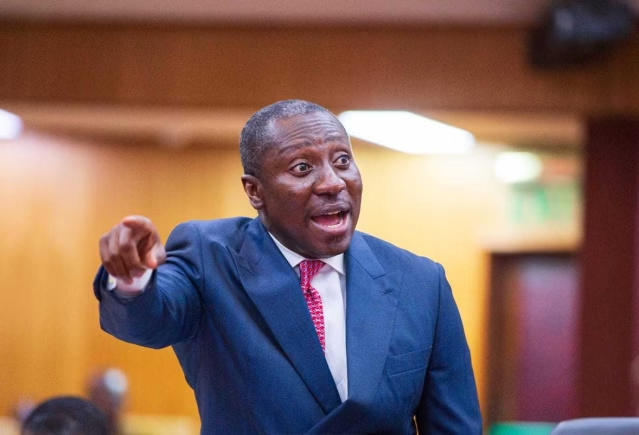In a bold statement against what he terms an “abuse of power,” Minority Leader Alexander Afenyo-Markin has publicly condemned the recent security operations targeting political opponents, specifically highlighting the controversial raid on former Bank of Ghana Governor Dr. Ernest Addison’s residence. This development adds to the growing tension between Ghana’s political factions over the boundaries of national security operations.
The Controversial Raid
The incident in question involves a raid conducted on the home of former Bank of Ghana Governor, Dr. Ernest Addison, by National Security personnel. According to reports, the operation was led by Richard Jakpa, the National Security Director of Operations, as part of ongoing investigations. This high-profile security action has sparked significant debate about the appropriate use of state security apparatus.
Government’s Defense Position
In response to public outcry, two senior government officials have stepped forward to defend the action:
- Deputy Attorney General and Minister for Justice, Justice Srem-Sai, characterized the raid as part of “standard procedures” within legitimate investigations
- Deputy Presidential Spokesperson Shamima Muslim similarly defended the action, describing such measures as “routine” in national security operations
These justifications, however, have only intensified criticism from opposition figures who view the raid as politically motivated overreach.
Opposition’s Strong Rebuke
In a pointed statement shared on X (formerly Twitter) on Friday, March 21, 2025, Minority Leader Alexander Afenyo-Markin expressed profound concern about the government’s approach and the defense mounted by officials.
“Abusing the Rights of political opponents is a fundamental assault on our democracy!” Afenyo-Markin declared, adding that government spokespersons “should not have been deployed to defend such unlawful actions by the Government!”
The Minority Leader’s statement reflects growing concern among opposition figures about what they perceive as the weaponization of state security agencies against political opponents.
Appeal to Presidential Intervention
Notably, Afenyo-Markin’s statement included a direct appeal to the President, acknowledging his reputation as a moderate while highlighting the contradiction between this image and recent events:
“Mr. President, you are widely perceived as a moderate, but these acts of abuse of power by your HAWKS which are also defended by your own Deputy Spokesperson and Deputy Attorney General speak very negatively of your leadership. Please rein in your HAWKS now!”
This appeal suggests the opposition believes these actions may be driven by hardliners within the administration rather than reflecting the President’s governance philosophy.
Broader Implications for Ghana’s Democracy
This incident raises important questions about the balance between national security imperatives and civil liberties in Ghana’s democratic landscape. According to the Ghana Center for Democratic Development, maintaining this delicate balance is crucial for preserving democratic institutions and public trust in governance.
Political analysts from the Institute for Democratic Governance suggest that such incidents can significantly impact public perception of democratic governance, particularly when security operations appear to target political figures selectively.
Legal and Constitutional Questions
Constitutional experts, including scholars from the Faculty of Law at the University of Ghana, have raised questions about the procedural aspects of such security operations:
- What judicial oversight exists for national security raids?
- Were proper warrants obtained before entering the former Governor’s residence?
- What safeguards exist to prevent potential abuse of national security powers?
These questions remain largely unanswered in the public domain, contributing to the incident’s controversy.
Historical Context and Patterns
This is not the first time Ghana has witnessed tensions between security agencies and political figures. The Ghana Institute of Journalism has documented similar controversies in past administrations, raising questions about whether such practices represent isolated incidents or systematic approaches to political opposition.
Conclusion
As Ghana continues to navigate its democratic journey, incidents like the raid on Dr. Addison’s residence are critical tests of the nation’s commitment to constitutional governance and respect for civil liberties. The strong condemnation from the Minority Leader highlights the polarized perspectives on security operations and their appropriate limits in a democratic society.
The coming days will likely determine whether this incident leads to meaningful dialogue about security practices or further entrenches political divisions within the country.
Take Action
For citizens concerned about democratic governance and civil liberties in Ghana, several avenues exist for engagement:
- Follow updates from credible sources like the Ghana Bar Association and civil society organizations monitoring democratic governance
- Participate in public forums on security sector reform and democratic accountability
- Support independent journalism that investigates and reports on potential abuses of power



